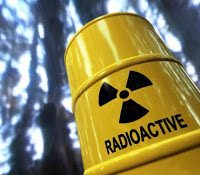Brandon Turbeville
Activist Post
In yet another example of how the nation’s waste management methods are absolutely unsustainable, a long-running debate between two waste disposal companies and a South Carolina environmental regulatory agency regarding the shipping of 300 railcars containing about 60,000 to 78,000 tons worth of radioactive dirt from New Jersey to South Carolina landfills is beginning to heat up yet again.
The waste at issue would be coming from a housing site in Sayreville, New Jersey that is currently being redeveloped and “cleaned up” for future purposes. The soil was originally recovered from an industrial cleanup site by the Raritan River, located south of New York City.
While it is claimed that the majority of the dirt contains “natural radiation,” SC regulators claim that radiation has been “technically enhanced” and has become more concentrated while at the site in New Jersey. This would, of course, cause the material to become more radioactive.
Yet Sayreville Seaport Associates, the company currently housing the contaminated soil, is still determined to outsource its own radioactive garbage to the Lee County, South Carolina dump that sits off of Interstate 20.
Unfortunately for Sayreville, the Lee County garbage dump, which is operated by Republic Services, is not designed for radioactive industrial waste – it is only designed to hold household garbage. Indeed, even the household garbage that it currently holds has become somewhat of a local issue regarding the overwhelming smell caused by the landfill.
With that in mind, it is fortunate that some South Carolina environmentalists and some state lawmakers are opposing the new dumping effort.
As Sammy Fretwell of The State wrote in his article entitled, “N.J. still targeting S.C. garbage dump for nuclear waste disposal,”
Disposing of out-of-state waste, particularly toxic waste, has for years been a sore spot among Palmetto State residents. The state at one point was home to a national nuclear waste landfill in Barnwell County, a regional hazardous waste dump at Lake Marion, hazardous waste incinerators in the Upstate and a medical waste incinerator outside Hampton. Many of those facilities have closed or ramped down operations since the 1990s, but big garbage dumps remain an issues.
Still, according to Fretwell’s article, records show that Republic was initially supportive of receiving the waste, and the Department of Health and Environmental Control (DHEC) even approved the disposal last year. However, DHEC soon changed its mind and stated that the dirt was too radioactive to be placed in the Lee County dump.
 Fretwell writes that DHEC then changed its mind once again, stating that the dirt was not too radioactive but that it did need to be handled with extra safety precautions and should not be allowed to sit for a long period of time.
Fretwell writes that DHEC then changed its mind once again, stating that the dirt was not too radioactive but that it did need to be handled with extra safety precautions and should not be allowed to sit for a long period of time.
Sayreville Seaport has appealed the decision made by DHEC, arguing that the agency is violating a federal law that prevents one state from keeping another state’s waste disposal out of its borders. Fretwell writes that Sayreville’s appeal claims DHEC’s decision “is considered a violation of the federal commerce clause.”
However, while it is unclear if Sayreville’s appeal will be successful, Repbulic Services has stated that the Lee County landfill “will not accept these soils,” even if Sayreville wins the legal battle.
Jamey Amick, a Republic executive told The State newspaper, “They [Sayreville Seaport] are trying to relax the guidelines enough where you could get Republic to huddle back up and say, ‘OK, yeah, we think we might can do that.’” He went on to say that “Republic will not accept this material under the current stipulations DHEC has asked us to modify.’”
Of course, to those who have any modicum of understanding of how interactions and agreements work between corporations and government agencies, Amick’s statement “under the current stipulations DHEC has asked us to modify” sounds anything but reassuring.
However, this writer was able to obtain an official statement from a media spokesperson at Republic which reads,
Lee County Landfill, LLC (LCL), the owner and operator of the Lee County Landfill near Bishopville, South Carolina will not accept these soils at the Landfill. LCL is not associated with Sayreville’s effort to gain DHEC approval for disposal of the soils in South Carolina.
Due to the extremely low levels of radioactive constituents, it is our understanding that the soils are not harmful to human health or the environment.
Thus, one must hope that this claim is not merely another corporation leaving itself an out; while, at the same time, making backroom deals to accept the soils.
Interestingly enough, as Fretwell reports:
South Carolina has a low-level nuclear waste dump near Barnwell that is available to New Jersey’s radioactive waste, but atomic waste experts have said it is cheaper to dispose of material in a garbage landfill. Burying the waste in South Carolina also would be cheaper than disposing of it in some Northeastern states, where dumping fees can be twice as high.
Obviously it’s cheaper to dump the dirt in a landfill designed for household garbage than it is to properly dispose of it in a facility designed to handle radioactive waste. It’s even cheaper to dump it right where you got it from to begin with. However, this issue is about the effect on the environment and the health of those who live near the waste – not what is more convenient or cost effective for a corporation.
 Indeed, there is also little doubt that dumping the dirt in the Northeastern states would bring much higher costs than it would in South Carolina. However, South Carolina didn’t make the waste.
Indeed, there is also little doubt that dumping the dirt in the Northeastern states would bring much higher costs than it would in South Carolina. However, South Carolina didn’t make the waste.
Is it the fault of South Carolina that the disposal of waste created by companies located in the Northeastern states actually costs more in the Northeastern states? If so, then it seems we are setting a very disturbing trend for South Carolina and other states to become the dumping grounds of the more populated and heavily taxed Northeastern part of the country.
This entire issue, however, only serves to illustrate an even larger concern which is that waste management has become an entirely privatized “service” that has been left in the hands of for-profit companies that care only about the bottom line – not providing services; and certainly not about the health and well-being of the environment and the people that might suffer as a result of their decisions.
The truth is that the entire system of waste management in the United States is wholly unsustainable.
Producing materials that are not biodegradable, or that have a life of radioactivity measuring in the billions of years cannot continue to be buried in a hole in the ground and forgotten about.
As I wrote in my book, Five Sense Solutions, the United States urgently needs a Manhattan Project-scale effort to discover new and affordable ways of recycling all forms of waste, be it household or radioactive; and a program implemented to make sure that recycling takes place. Of course, this program should be conducted without the help of trash can spies or garbage police; and it should also be implemented as a public service – not a private asset-stripping operation. Ultimately, even waste that has been buried in the past should become a candidate for recycling.
Digging a hole for collective refuse has never been a successful means of waste disposal in human history – digging bigger ones will not change that fact.
You can support this information by voting on Reddit HERE
Read other articles by Brandon Turbeville here.
Brandon Turbeville is an author out of Mullins, South Carolina. He has a Bachelor’s Degree from Francis Marion University and is the author of three books, Codex Alimentarius — The End of Health Freedom, 7 Real Conspiracies, and Five Sense Solutions and Dispatches From a Dissident. Turbeville has published over one hundred articles dealing with a wide variety of subjects including health, economics, government corruption, and civil liberties. Brandon Turbeville is available for podcast, radio, and TV interviews. Please contact us at activistpost (at) gmail.com.
linkwithin_text=’Related Articles:’
Leave a comment
You must be logged in to post a comment.



Be the first to comment on "N.J. Wants to Outsource Radioactive Garbage to South Carolina"